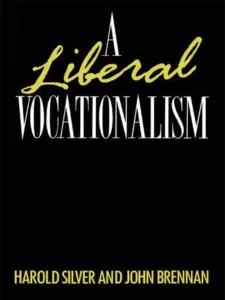by John Brennan, Emeritus Professor of Higher Education Research, The Open University

A Liberal Vocationalism was the title of a project and book written by Harold Silver and John Brennan back in the 1980s. It researched the extent and ways in which the vocational side of higher education was trying to legitimise itself against the quality and standards of the liberal academic side. Today, a Vocational Liberalism would research the extent and ways in which the liberal academic side of higher education is trying to legitimise itself against the features and pressures of the vocational side.
The ‘liberal academic’ and the ‘vocational’ features place their educational focus as follows:
| The liberal academic | The Vocational |
| Education | Training |
| Theory | Practice |
| Liberal | Vocational |
| Knowledge | Skills |
| Critical Thinking | Rule Following |
In the 1980s, most universities were mainly focused on the liberal academic side whilst those on the vocational side were attempting to adapt themselves to the features on the left list above. However, today, it is universities on the left who are finding a need to adapt themselves to features on the right. We can read all the time that higher education is important because it provides ‘skills for jobs’.
Of course, there is always diversity within institutions and the 1980s project focused on vocational subjects such as Engineering and Business Studies. A new project would be more likely to focus more on the Humanities and Social Sciences. While policies and debates about higher education in the UK currently emphasise ‘skills for jobs’ as the key focus, 40 years ago ‘knowledge for critical thinking’ would have been a more common emphasis. I remember more than once interviewing employers of graduates who explained to me that they recruited graduates to ‘change jobs’ not just to ‘do jobs’.
Some research questions today might include the following:
- How much and how do the liberal academic subjects move towards the vocational?
- How much of the liberal academic features can they keep as well? And what is the balance and relationship between the liberal and the vocational?
- And what are the institutional policies on the relationships?
- And how do the academics react?
- And how do employers react?
- What are the graduate employment outcomes for students studying liberal arts subjects?
Of course, higher education institutions differ and responses to the pressures to move from academic liberalism to vocationalism may well differ as well, quite possibly according to the distinction made by the American sociologist, Martin Trow, between elite, mass and universal higher education institutions, with the elite moving the least and the universal moving the most, and the mass in between.
Going back to the 1980s, higher education emphasised critical thinking as a key focus. And the Sliver and Brennan project found that this was also the case in vocational courses such as accountancy and law. Now it’s skills for jobs.
And one last memory of some of the higher education literature is the idea of universities being ‘troublesome institutions’, partly as a result of the critical thinking. What does the world today need more, skills for jobs or critical thinking? Maybe both?
John Brennan